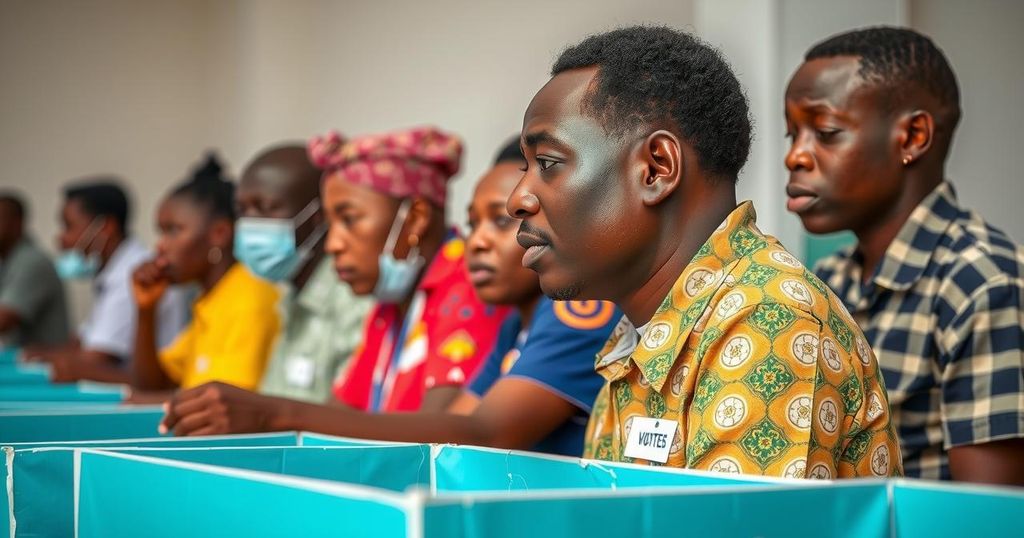Gabon’s Referendum Yields Overwhelming Support for New Constitution

Gabon’s military government announced that 91.8% of voters approved a new constitution in a referendum. The proposed constitution introduces term limits for the presidency, eliminates the prime minister role, and prohibits dynastic succession. Despite the junta’s extensive media campaign, voter turnout was reported at 53.54%. Critics argue the changes could reinforce dictatorial rule, while public confidence in the transitional president remains relatively high amidst concerns about unemployment and living costs.
Gabon’s military leadership has reported that a significant majority of voters approved a new constitution in a recent referendum, heralding a potential transformation for the oil-rich nation. Approximately 860,000 registered voters were called upon by authorities through various media channels to participate in the vote. The constitution proposes a presidential term limit of two seven-year terms and eliminates the post of prime minister, as well as preventing dynastic succession. According to provisional results, 91.8 percent of voters favored the new constitution, as announced by the Committee for the Transition and Restoration of Institutions (CTRI).
Despite the campaign’s heavy reliance on official propaganda from the ruling junta, which took control in August 2023 following a coup, local media highlighted voter turnout as a critical component. The interior ministry reported a turnout of 53.54 percent, lower than the previously announced 71 percent by Gabon TV. Fortunately, the voting process across 2,835 polling stations nationwide progressed without major incidents, adhering to a deadline that extended a curfew to midnight as part of the electoral process.
The proposed constitution stipulates that presidential candidates must be exclusively Gabonese, with at least one Gabon-born parent and a Gabonese spouse, a stipulation that would exclude former president Ali Bongo Ondimba and his family. Transitional president Brice Oligui Nguema, who described the referendum as a “great step forward,” expressed confidence in the transparency of the voting process. Critics, however, argue that the constitution’s design might pave the way for dictatorial rule, suggesting that it is tailored to maintain Oligui’s power. Nathalie Badzoko, a civil servant, shared her hopes for the junta while admitting familiarity only with parts of the constitutional text.
Moreover, concerns about economic conditions continue to linger, with unemployment and cost of living cited as primary issues by the populace. An Afrobarometer survey indicated that nearly 87 percent believed the country was moving in a positive direction, with more than 46 percent expressing great confidence in Oligui. As the nation awaits the formal announcement of results by the constitutional court, the future of Gabon’s governance remains uncertain yet pivotal.
The context of Gabon’s recent constitutional referendum stems from a coup that ousted long-time leader Ali Bongo Ondimba, who faced widespread allegations of corruption and poor governance during his tenure. Following the coup in August 2023, the junta led by Brice Oligui Nguema committed to returning power to civilian rule after a two-year transition period. The proposed constitutional changes seek to reshape Gabon’s political landscape, notably establishing term limits for the presidency and eliminating dynastic power transitions. The referendum was heavily promoted through state media and occurred during a climate of scrutiny regarding the new government’s legitimacy and the transparency of its electoral processes. Economic concerns, particularly high unemployment, have played a significant role in the public’s perspective of governance, as reflected in various surveys conducted among Gabonese citizens. The political climate remains charged, as the populace navigates the implications of the junta’s proposed policies and their potential impact on democratic rights and stability in the country.
The provisional results indicating overwhelming support for Gabon’s new constitution reflect a decisive, albeit contentious, shift in the political landscape following a military coup. With significant changes proposed, including term limits for the presidency and restrictions on candidate eligibility, the implications of this referendum extend well beyond the immediate governance framework. As the junta seeks to transition back to civilian rule, concerns regarding economic stability and the potential for dictatorial governance continue to resonate among the populace. The final results remain pending, with the eyes of the nation fixed on the constitutional court for confirmation.
Original Source: www.tiogapublishing.com








